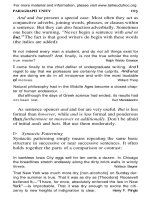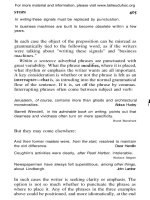Essential guide to writing part 7
Bạn đang xem bản rút gọn của tài liệu. Xem và tải ngay bản đầy đủ của tài liệu tại đây (279.03 KB, 15 trang )
POINT OF VIEW, PERSONA, AND TONE
of that role. It is that creator, that total intelligence and sen-
sibility, which constitutes the persona.
For Practice
> Selecting a passage from a magazine or book, write a descrip-
tion of its point of view, persona, and tone. Be specific, anchoring
your assessments in particular words and phrases.
For more material and information, please visit www.tailieuduhoc.org
CHAPTER
Basic Structure
Expository paragraphs deal with facts, ideas, beliefs. They ex-
plain, analyze, compare, illustrate. They answer ques-
tions like What? Why? How? What was the cause? The ef-
fect? Like what? Unlike what? They are the kinds of
paragraph we write in reports or term papers or tests.
The term paragraph has no simple definition. Occasionally
a single sentence or even a word may serve as an emphatic
paragraph. Conventionally in composition, however, a para-
graph is a group of sentences developing a common idea,
called the topic.
An expository paragraph is essentially an enlargement of a
subject/predicate pattern like "Dogs bark." But the subject is
more complicated and needs to be expressed in a clause or
sentence, called the topic statement, which is usually placed
at or near the beginning. The is, what is as-
serted about the several sentences. These con-
stitute the body of the paragraph, developing or supporting
the topic in any of several ways, ways we shall study in sub-
sequent chapters.
No one can say how long a paragraph should be. Subject,
purpose, audience, editorial fashion, and individual prefer-
ence, all affect the length and complexity of paragraphs. As a
rough rule of thumb, however, you might think of expository
For more material and information, please visit www.tailieuduhoc.org
THE EXPOSITORY PARAGRAPH
paragraphs in terms of 120 or 150 words. If most of your
paragraphs fall below 100 or 60, chances
are they need more development. If your paragraphs run con-
sistently to 200 or 300 words, they are probably too long and
need to be shortened or divided. Numerous brief paragraphs
are liable to be disjointed and underdeveloped. Great long
ones fatigue readers. But are talking about a
very broad average. An occasional short paragraph of 15 to
20 words may work very well; so may an occasional long one
of 300.
The Topic Sentence
A good topic sentence is concise and emphatic. It is no longer
than the idea requires, and it stresses the important word or
phrase. Here, for instance, is the topic statement which opens
a paragraph about the collapse of the stock market in 1929:
The Big Bull Market was dead. Frederick Lewis
Notice several things. (1) Allen's sentence is brief. Not all
topics can be explained in six words, but whether they take
six or sixty, they should be phrased in no more words than
are absolutely necessary. (2) The sentence is clear and strong:
you understand exactly what means. (3) It places the
key the end, where it gets heavy stress and
leads naturally into what will follow. Of course, if a topic
sentence ends on a key term, it must do so naturally, without
violating any rules of word order or idiom. (4) The sentence
stands in the paragraph. This is where topic statements
generally belong: at or near the beginning.
To attract attention topic sentences sometimes appear in
the form of rhetorical questions:
What then is the modern view of Joan's voices and messages from
God? George Bernard Shaw
For more material and information, please visit www.tailieuduhoc.org
BASIC STRUCTURE
What did Lincoln's Emancipation Proclamation accomplish?
J. G. Randall
Rhetorical questions are easy ways of generating paragraphs.
Perhaps too easy; so use them with restraint. Once is probably
enough in a short piece of writing.
Another eye-catching form of topic statement is the frag-
ment, the grammatically incomplete sentence, as in the second
paragraph of this passage (italics added):
Approaching the lake from the south, spread out, high up in a great
V, was a flock of Canada geese. They did not land but continued
on their way, trailed by the brass notes of their honking.
Spring. How perfect its fanfare. No trumpets or drums could ever
have so triumphantly announced the presence of royalty. stood
marveling in their wake until, cold, returned to the firs to see what
else Could up. Ruth
But fragments, too, are effective only if they are used with
restraint. Most of the time the best topic statement is a strong,
clear, grammatically complete, declarative sentence.
Sentences as the Analytic Elements
of a Paragraph
The sentences of a good expository paragraph reflect a clear,
rational analysis of the topic. Here is a brief example, this one
by Bertrand Russell. (The sentences have been numbered for
convenience.)
[1] The intellectual life of the nineteenth century was more com-
plex than that of any previous age. [2] This was due to several
causes. [3] First: the area concerned was larger than ever before;
America and Russia made important contributions, and Europe be-
came more aware than formerly of Indian philosophies, both an-
cient and modern. [4] Second: science, which had been a chief
source of novelty since the seventeenth century, made new con-
quests, especially in geology, biology, and organic chemistry.
For more material and information, please visit www.tailieuduhoc.org
THE EXPOSITORY PARAGRAPH
[5] Third: machine production profoundly altered the social struc-
ture, and gave men a new conception of their powers in relation
to the physical environment. [6] Fourth: a profound revolt, both
philosophical and political, against traditional systems of thought,
in politics and in economics, gave rise to attacks upon many beliefs
and institutions that had hitherto been regarded as unassailable.
[7] This revolt had two very different forms, one romantic, the other
rationalistic. [8] (I am using these words in a liberal sense.) [9] The
romantic revolt passes from Byron, Schopenhauer, and Nietzsche
to Mussolini and Hitler; the rationalistic revolt begins with the
French philosophers of the Revolution, passes on, somewhat soft-
ened, to the philosophical radicals in England, then acquires a
deeper form in Marx and issues in Soviet Russia.
Russell's nine sentences correspond to his steps in analyz-
ing his topic:
Sentence Idea
Topic: increasing intellectual complexity
Plan: list several causes
First cause: larger area
Second cause: science
Third cause: machine production
Fourth cause: intellectual revolt
two forms
qualification
specification of the two forms
Examining whether the sentences of a paragraph corre-
spond with its ideas is a good test of the coherence of the
paragraph. The correspondence need not be as exact as in
Russell's paragraph (and usually will not be). But if you can-
not outline a generally clear relationship, the paragraph is
probably confused and confusing.
The fact that a paragraph like Russell's reveals a coherent
logical structure does not imply that the writer worked from
an outline. One can proceed in this way, but in writing of any
length an outline is tedious and time-consuming. Experienced
For more material and information, please visit www.tailieuduhoc.org
BASIC STRUCTURE
writers adjust sentences to thought intuitively, without con-
stantly thinking about when to begin a new sentence. Those
with less experience must remain more conscious of the prob-
lem. Working up paragraphs from outlines provides good
practice. But whether it is consciously thought out or intui-
tive, a well-made paragraph uses sentences to analyze the
subject.
For Practice
Selecting one of the general subjects listed below, compose ten
topic sentences, each on a different aspect of the subject, with an
eye to developing a paragraph of about words. Aim at clarity,
emphasis, concision. Experiment with placing key words at the end
of the sentence and with one or two rhetorical questions and
fragments.
The economic future as you see it
National or local politics
Popular entertainment
Sports
Sexual relationships
Make an outline like that for Russell's paragraph, showing how
the sentences of the following paragraph relate to its ideas. The
analysis might begin like this:
Sentence Idea
1 Topic: a paradox about grammar
2 Specification: first part of the regard
grammar as dull
> [1] A curious paradox exists in regard to grammar. [2] On the
one hand it is felt to be the dullest and driest of academic subjects,
fit only for those in whose veins the red blood of life has long since
turned to ink. [3] On the other, it is a subject upon which people
who would scorn to be professional grammarians hold very dog-
matic opinions, which they will defend with considerable emotion.
For more material and information, please visit www.tailieuduhoc.org









